人教版必修五unit5语法:省略句强化训练题
人教版高中英语必修5 unit 5 巩固练习 省略
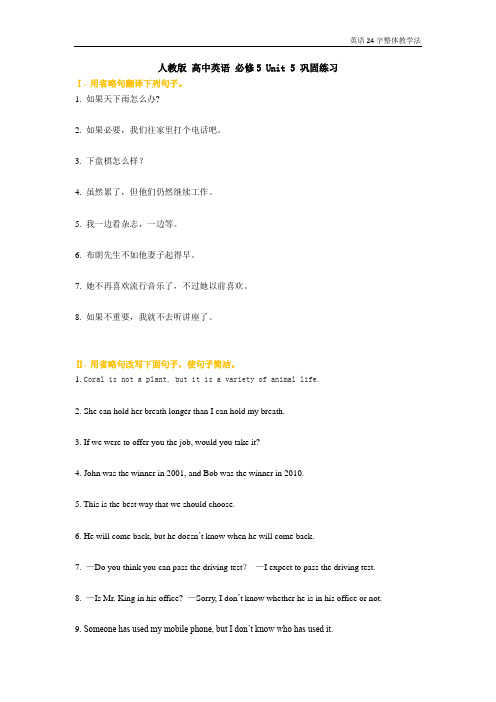
人教版高中英语必修5 Unit 5 巩固练习Ⅰ. 用省略句翻译下列句子。
1. 如果天下雨怎么办?____________________________________________________2. 如果必要,我们往家里打个电话吧。
____________________________________________________3. 下盘棋怎么样?____________________________________________________4. 虽然累了,但他们仍然继续工作。
____________________________________________________5. 我一边看杂志,一边等。
____________________________________________________6. 布朗先生不如他妻子起得早。
____________________________________________________7. 她不再喜欢流行音乐了,不过她以前喜欢。
____________________________________________________8. 如果不重要,我就不去听讲座了。
____________________________________________________Ⅱ. 用省略句改写下面句子,使句子简洁。
1. Coral is not a plant, but it is a variety of animal life.____________________________________________________2. She can hold her breath longer than I can hold my breath.____________________________________________________3. If we were to offer you the job, would you take it?____________________________________________________4. John was the winner in 2001, and Bob was the winner in 2010.____________________________________________________5. This is the best way that we should choose.____________________________________________________6. He will come back, but he doesn’t know when he will come back.____________________________________________________7. —Do you think you can pass the driving test?—I expect to pass the driving test. ____________________________________________________8. —Is Mr. King in his office? —Sorry, I don’t know whether he is in his office or not. ____________________________________________________9. Someone has used my mobile phone, but I don’t know who has used it.____________________________________________________10. He is rather difficult to make friends with, but his friendship, once it is gained, is more truethan any other’s.____________________________________________________Ⅲ. 单项选择。
人教版高中英语必修5语法训练-Unit5省略句
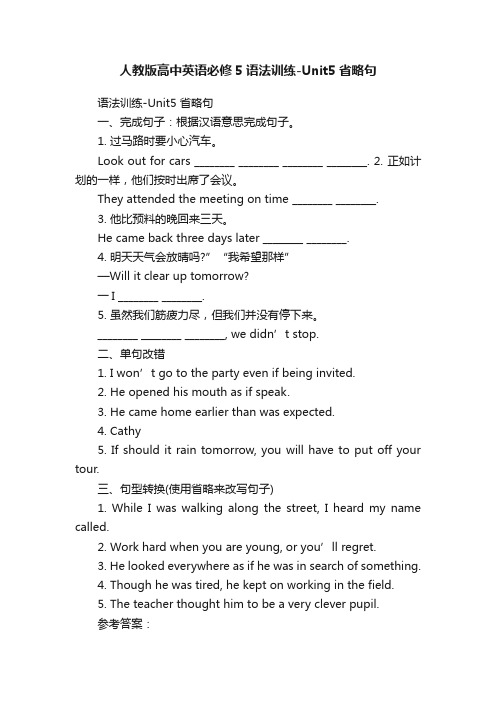
人教版高中英语必修5语法训练-Unit5省略句语法训练-Unit5 省略句一、完成句子:根据汉语意思完成句子。
1. 过马路时要小心汽车。
Look out for cars ________ ________ ________ ________. 2. 正如计划的一样,他们按时出席了会议。
They attended the meeting on time ________ ________.3. 他比预料的晚回来三天。
He came back three days later ________ ________.4. 明天天气会放晴吗?”“我希望那样”—Will it clear up tomorrow?一I ________ ________.5. 虽然我们筋疲力尽,但我们并没有停下来。
________ ________ ________, we didn’t stop.二、单句改错1. I won’t go to the party e ven if being invited.2. He opened his mouth as if speak.3. He came home earlier than was expected.4. Cathy5. If should it rain tomorrow, you will have to put off your tour.三、句型转换(使用省略来改写句子)1. While I was walking along the street, I heard my name called.2. Work hard when you are young, or you’ll regret.3. He looked everywhere as if he was in search of something.4. Though he was tired, he kept on working in the field.5. The teacher thought him to be a very clever pupil.参考答案:一、1. when crossing the streets2. as planned3. than expected4. hope so5. Though worn out二、1. 去掉being2. if后加to3. 去掉was4. 去掉to5. 去掉if,should首字母大写三、1. While walking along the street, I heard my name called.2. Work hard when young, or you’ll regret.3. He looked everywhere as if in search of something.4. Though tired, he kept on working in the field.5. The teacher thought him a very clever pupil.。
高二英语人教版必修5Unit 5 省略语法要点精讲、跟踪训练、课时作业(含答案解析)
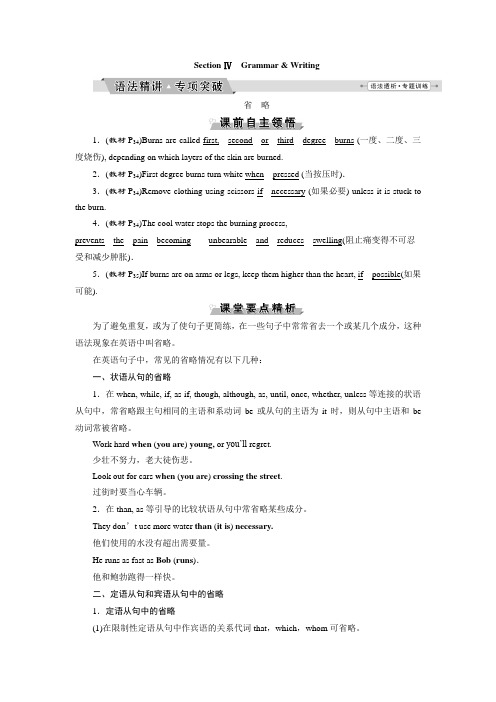
Section ⅣGrammar & Writing省略1.(教材P34)Burns are called first,__second__or__third__degree__burns (一度、二度、三度烧伤), depending on which layers of the skin are burned.2.(教材P34)First degree burns turn white when__pressed (当按压时).3.(教材P34)Remove clothing using scissors if__necessary (如果必要) unless it is stuck to the burn.4.(教材P34)The cool water stops the burning process,prevents__the__pain__becoming____unbearable__and__reduces__swelling(阻止痛变得不可忍受和减少肿胀).5.(教材P35)If burns are on arms or legs, keep them higher than the heart, if__possible(如果可能).为了避免重复,或为了使句子更简练,在一些句子中常常省去一个或某几个成分,这种语法现象在英语中叫省略。
在英语句子中,常见的省略情况有以下几种:一、状语从句的省略1.在when, while, if, as if, though, although, as, until, once, whether, unless等连接的状语从句中,常省略跟主句相同的主语和系动词be或从句的主语为it时,则从句中主语和be 动词常被省略。
Work hard when (you are) young, or you’ll regret.少壮不努力,老大徒伤悲。
必修五 Unit 5语法省略
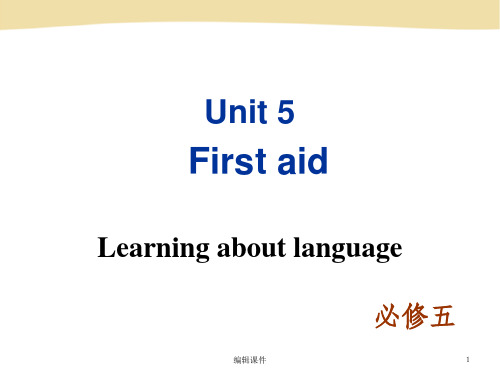
I told him to sit down and wait for a moment. 2) help 当“帮助”讲时, 后面的宾语或宾补的
不定式符号to可带可不带。
I will help (to) do it for you.
I will help you (to) do it. (3) 介词but前若有动词do, 后面的不定式不带
(2) Were I you, I would do the work better. (If I were you)
(3) Should there be a flood, what should we do?
(If there should be a flood)
编辑课件
18
5. 英语中有一些固定的省略结构: 在以if, when, though, as if (好象)等连词引导 的从句中, 如从句中的主要动词是be, 常将主语 it 和动词be 省略。 If it is necessary, we shall send a telegram home. 如有必要,我们就往家里打电报。 Whenever it is possible, he will come to my help. 他一有可能就来帮助我。
to. The boy did nothing but play.
编辑课件
15
4) 某些使役动词(let, make, have)及感官动词
(see, watch, hear, notice, observe, feel, look at,
listen to等)后面作宾语补足语的不定式一定
要省去 to,但在被动语态中须将to 复原。
They do not visit their parents as much as they ought to (visit their parents). 3. 主句与从句各有一些成分被省略。
高中英语新人教版必修5语法练习
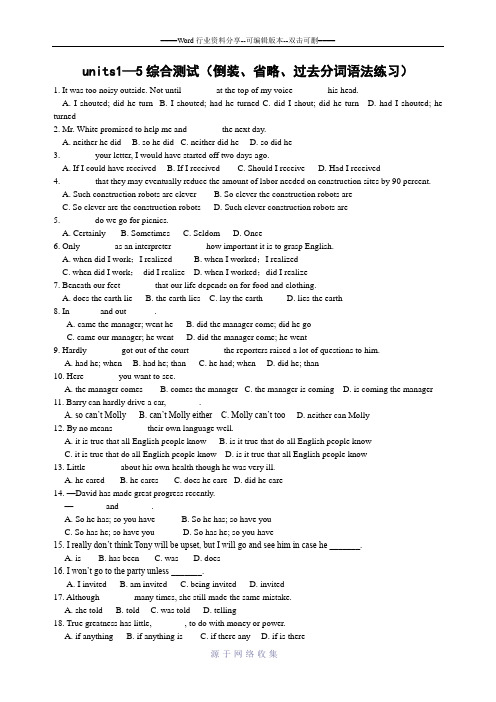
units1—5综合测试(倒装、省略、过去分词语法练习)1. It was too noisy outside. Not until _______ at the top of my voice _______ his head.A. I shouted; did he turnB. I shouted; had he turnedC. did I shout; did he turnD. had I shouted; he turned2. Mr. White promised to help me and _______ the next day.A. neither he didB. so he didC. neither did heD. so did he3. _______ your letter, I would have started off two days ago.A. If I could have receivedB. If I receivedC. Should I receiveD. Had I received4. _______ that they may eventually reduce the amount of labor needed on construction sites by 90 percent.A. Such construction robots are cleverB. So clever the construction robots areC. So clever are the construction robotsD. Such clever construction robots are5. _______ do we go for picnics.A. CertainlyB. SometimesC. SeldomD. Once6. Only _______ as an interpreter _______ how important it is to grasp English.A. when did I work;I realizedB. when I worked;I realizedC. when did I work;did I realizeD. when I worked;did I realize7. Beneath our feet _______ that our life depends on for food and clothing.A. does the earth lieB. the earth liesC. lay the earthD. lies the earth8. In ______ and out ______.A. came the manager; went heB. did the manager come; did he goC. came our manager; he wentD. did the manager come; he went9. Hardly _______ got out of the court _______ the reporters raised a lot of questions to him.A. had he; whenB. had he; thanC. he had; whenD. did he; than10. Here _______ you want to see.A. the manager comesB. comes the managerC. the manager is comingD. is coming the manager11. Barry can hardly drive a car, _______.A. so can’t MollyB. can’t Molly eitherC. Molly can’t tooD. neither can Molly12. By no means _______ their own language well.A. it is true that all English people knowB. is it true that do all English people knowC. it is true that do all English people knowD. is it true that all English people know13. Little _______ about his own health though he was very ill.A. he caredB. he caresC. does he careD. did he care14. —David has made great progress recently.—_______ and _______.A. So he has; so you haveB. So he has; so have youC. So has he; so have youD. So has he; so you have15. I really don’t think Tony will be upset, but I will go and see him in case he _______.A. isB. has beenC. wasD. does16. I won’t go to the party unless _______.A. I invitedB. am invitedC. being invitedD. invited17. Although _______ many times, she still made the same mistake.A. she toldB. toldC. was toldD. telling18. True greatness has little, _______, to do with money or power.A. if anythingB. if anything isC. if there anyD. if is there19. ________ that you are ten minutes late for the meeting?A. How aboutB. What aboutC. How comeD. How happened20. ---Where did you meet the girl who later became your wife?---It was on the river bank _____ I often did some reading in the morning.A. thatB. in whichC. whereD. when21. The _______ loo k on the student’s face suggested that your ______question made him ________.A. puzzling; puzzling; puzzledB. puzzled; puzzled; puzzlingC. puzzling; puzzled; puzzledD. puzzled; puzzling; puzzled22. The little boy is ________ in his studies though he is ______ in many other ways.A. disappointed; interestedB. disappointing; interestingC. disappointing; interestedD. disappointed; interesting23. _______ to his research, the old professor has often to be reminded to have his dinner.A. Having devotedB. Being devotedC. DevotingD. Devoted24. ________more attention, the trees would have grown better.A. GivenB. Being givenC. Having givenD. Give25. When the housewife returned home, she was ______ to see a stranger ______on the sofa, _____ and asleep.A. surprised; seating; drunkB. surprising; seated; drinkingC. surprised; seated; drunkD. surprising; sitting; drinkingII. 完形填空It was 11:30 in the evening. A ___26___ American lady of about seventy was standing on the side of an Alabama ___27___ trying to bear a pouring rainstorm. Her car had ___28___ and at the moment she ___29___ needed a ride. Wet to the skin, she decided to flag down the next ___30___. A young white man stopped to help her—generally unheard ___31_____ in those conflict-filled(矛盾冲突) 1960s. The man ___32___ her to safety in his car, and ___33____ a taxicab(a kind of car)for her. She seemed to be in a great ___34___. She wrote down his ___35___, thanked him and drove away. Several days went by and a ___36___ came on the man’s door. To his ___37___, a very big color TV was delivered to his home. A special note was ___38___ to it. It read: “ Dear sir, thank you so much for assisting a(an) ___39___ colored woman on the freeway ___40____ night, The rain ____41____ wet all over not only my clothes ___42___ my spirits. Then you ___43___ along. Because of you, I was ____44___ to make it to my dying husband’s bedsi de just ___45____ he passed away. God bless you for helping me and kindly serving others. Sincerely, Mrs. Nat King Cole.26.A. black B. white C. poor D. sick27.A. railway B. freeway C. street D. avenue28.A. broken up B. speeded up C. broken down D. slowed down29.A. seriously B. badly C. fairly D. probably30.A. bus B. truck C. taxi D. car31.A. from B. by C. before D. of32.A. put B. led C. fetched D. took33.A. hired B. took C. sent D. asked34.A. need B. help C. hurry D. trouble35.A. address B. number C. name D. words36.A. lady B. salesman C. letter D. knock37.A. surprise B. delight C. joy D. satisfaction38.A. offered B. given C. stuck D. written39.A. aged B. dark C. lucky D. unhappy40.A. another B. the other C. other D. any41.A. let B. made C. had D. turned42.A. and B. but C. or D. otherwise43.A. got B. went C. ran D. came44.A. able B. ready C. likely D. willing45.A. after B. before C. until D. sinceIII 阅读理解第一节:阅读下列短文,从每题所给的A、B、C、D四个选项中,选出最佳选项。
必修五期中复习专项训练:强调、倒装、省略

必修五期中复习专项训练:强调、倒装、省略―、句型转换(共15小题;每小题1分,共15分)1. Though it may appear strange, it is true.it may appear, it is true.2. I have seldom seen a situation which made me so angry.a situation which made me so angry.3. They not only take care of me, but also treat me as if I were their own daughter.take care of me,but also treat me as if I were their own daughter.4. The price was so unreasonable that everybody was surprised.that everybody was surprised.5. We have so much work to do that we have no time to relax.that we have no time to relax.6. It might have saved me some trouble if I had known the schedule.It might have saved me some trouble the schedule.7. If you were to buy a new car, which of these would you choose?to buy a new car, which of these would you choose?8. He couldn’t tell us exactly what made him in such a bad mood.He couldn’t tell us exactly made him in such a bad mood.9. (2017 •杭州二中月考)David didn’t realize it was Sunday until he found nobody was in the school.Not until he found nobody was in the school it was Sunday.10. (2016 •天津卷改编)You are waiting at a wrong place. The coach picks up tourists at the hotel.You are waiting at a wrong place. It is the coach picks up tourists.11. Those boys who come from the countryside are seated in a circle around the old man.are those boys who come from the countryside.12. We should by no means neglect the importance of communication with our children.By no means the importance of communication with our children.13. If you had worked harder last year, you would probably have passed your exam.harder last year, you would probably have passed your exam.14. If you are accepted for the job, you’l l be informed soon.If for the job, you’ll be informed soon.15. He didn't feel a bit nervous when he was interviewed.He didn’t feel a bit nervous .二、根据汉语意思和句末括号内的要求完成句子(共10小题;每小题1分,共10分)1.我弄不清楚他为什么能把这封信的内容背了下来。
必修五Unit 5 语法省略
Read the sentences aloud. Task 1: 请用括号标出下列句子中可省略的 部分。 4. Although (I am) invited, I won’t go there. 5. Whenever(you are)in trouble, turn to me 4. for Although help. invited, I won’t go there. 5.6. Whenever If(it is)possible, in trouble, I’d like turn toto go me out for for help. a 6. while. If possible, I’d like to go out for a while.
Task 4: 请修改以下病句。 6. Once it published, the book will be very popular. Once it is published, the book will be very popular. Once published, the book will be very popular.
Task 3: 请用从句的省略形式翻译下列句子。 4. 他会保持沉默,除非有人问他。 ______ ______, Unless asked he will keep silent. 5. 无论何时有可能,你应该练习说英语。 Whenever possible you are supposed to _________ _________, practice speaking English. 6. 如果方便的话,我想去拜访您。 __ ___________, I’d like to visit you. If convenient
人教版英语必修5第五单元语法省略
Now it’s your turn to find out what have been left out.
1. Haven’t seen you for ages. I haven’t seen you for ages. 2. Some more tea? Would you like some more tea? 3. Sounds like a good idea. That / It sounds like a good idea.
虚拟条件句中的省略
在以if引导的非真实条件句中若含有were, had, should时,常可以省略if而将were, had, should 置于句首。
If I were you, I’d give the AIDS patient a hug.
Were I you, I’d give the AIDS patient a hug. If I had a lot of money, I’d aid the poor children. Had I a lot of money, I’d aid the poor children.
谓语或谓语
的一部分
A: Where has Mr Smith gone? B: Sorry, I don’t know (where he has gone.) (1) (Are you) Hungry? 主语和谓语 宾语
(2) (I want) Orange juice, (或主语和谓语 的一部分) please.
It’s/ What a pity you couldn’t come. 7. This way, please. Step this way, please.
在感叹句中,有时可省略 后面的主语和系动词
新课标必修5第5单元语法 省略(语法)
8).宾语从句中的省略 1)由which, when, where, how和why 引导的宾 语从句中与主句重复的主语或谓语,可全部或部 分省去,只保留引导词。 如:Please pass me one of these books, I don’t care which (book you pass me). He will come back, but she doesn’t know when (he will come back). She wants to learn English well, yet she doesn’t know how (she can learn it well).
a. —Do you believe our team will win? —I guess so (your team will win). —I guess not (your team will not win). b. —Do you think it will rain? —I hope so (it will rain). —I hope not (that it will not rain). c. ―Will we be late? ―I'm afraid so /not
5. 使役动词 have , let ,make 和感官动词 feel ,see, watch, notice, look at , hear, listen to 等后面的不定式做宾语补足语时, 省略 to,但被动语态中要加上. He had two boys wash his car . She saw him walk into the house. He was seen to walk into the house.
【高二】高二英语必修5 Unit 5语法训练题(带答案)
【高二】高二英语必修5 Unit 5语法训练题(带答案)Ⅰ.单项填空1.(2021年高考大纲全国卷Ⅰ)―Everybody is going to clib the ountain. Can I go too, o?―________Wait till you are old enough, dear.A.Will you?B.Why not ?C.I hope so. D.I’ afraid not.解析:选D。
句意:“每个人都要去登。
妈妈,我也可以去吗?”“恐怕不能。
得等到你足够大的时候,亲爱的。
”Will you?“是吗?”,why not?“为什么不呢?”,I hope so.“我希望如此”,三者均不符合句意。
应选D项“恐怕不能”。
2.(2021年高考浙江卷)The experient shows that proper aounts of exercise,if ________ regularly, can iprove our health.A.being carried out B.carrying outC.carried out D.to carry out解析:选C。
句意:实验表明如果有规律地进行适量的运动(锻炼),会增进我们的健康。
此处if引导省略句,全句应为:if proper aounts of exercise are carried out regularly。
根据省略的原则,把相同的主语和系动词be省去,就只剩下carried out regularly。
3.(2021年高考江苏卷)―What’s the atte r with Della?―Well, her parents wouldn’t allow her to go to the party, but she still ________.A.hopes to B.hopes soC.hopes not D.hopes for解析:选A。
- 1、下载文档前请自行甄别文档内容的完整性,平台不提供额外的编辑、内容补充、找答案等附加服务。
- 2、"仅部分预览"的文档,不可在线预览部分如存在完整性等问题,可反馈申请退款(可完整预览的文档不适用该条件!)。
- 3、如文档侵犯您的权益,请联系客服反馈,我们会尽快为您处理(人工客服工作时间:9:00-18:30)。
人教版必修五unit5语法:省略句强化训练题一、用所给词的适当形式填空(1)1. When ______________ (heat), water is turned into vapour.2. Wood gives much smoke while _____________ (burn).3. The letter is to be left here until _________________ (call) for.4. He looked about as if __________________ (search) for something.5. Do you have any difficulty _________________ (express) yourself in English?6. He spent some time _______________ (squeeze) the wet coat dry.7. When first ______________ (introduce) to the market, these products enjoyed great success.8. It shames me to say it, but I told a lie when ________________ (question) at the meeting by my boss.9. English words are easily forgotten, unless constantly ________________ (repeat).10. The Olympic Games, first _________(pla y) in 776 BC, didn’t include women players until 1912.(2)1. Although______________ (tell) to stop, he kept on working.2. —What’s Joan doing? —_________________ (read) newspapers in the room.3. You shouldn’t go back to your seat unless__________________ (ask) to.4. If not______________ (take) care of, the plants will die.5. While_________________ (drive), one should pay attention to traffic signs.6. The photos____________ (take) in Beijing attracted many children.7. She did all she could__________________ (help) us.8. He spent four hours___________________ (go) over his lessons.9. Lucy never goes out at night, and so__________________ (do) Mary.10. It is suggested that we___________________ (go) to see the film.二.句型转换(1)1. A: He is as tall as you are if he is not taller than you.B: He is as tall as you if __________ __________.2. A: You may ask him questions if you have any questions to ask.B: You may ask him questions ________ ________.3. A: Errors, if there are any, should be corrected.B: Errors, __________ __________, should be corrected.4. A: When I am in trouble, I always turn to her for help.B: When __________ __________, I always turn to her for help.5. A: While we were there, we were thinking of you all the time.B: __________ __________, we were thinking of you all the time.6. A: If it were not for dust, there would be no drops.B: __________ __________ for dust, there would be no drops.7. A: When it is necessary, you can help us to do something.B: __________ __________, you can help us to do something.8. A: He made up his mind to finish the experiment whether it was difficult or not.B: He made up his mind to finish the experiment _________ _________ _________ _________.9. A: Some books are to be tasted, while others are to be swallowed.B: Some books are to be tasted, while _________ _________ __________ __________.10. A: He works very hard though he is still rather weak.B: __________ __________ _________ _________, he works very hard.(2)1. She works hard. It is no wonder that she passed the exam.→She works hard. ________ ________ ________ ________ ________ ________.2.They haven’t completed the project,but they ought to have completed it.→They haven’t completed the project,but ________ ________ ________ ________.3.It is well done.→________ ________.4.If it is possible,you should try it again.→________ ________,you should try it again.5.If we had gone to the party,we would have known the fact.→________ ________ ________ ________ ________ ________,we would have known the fact.三.用省略结构完成句子(1)1.Some of you may have finished Unit 1.________ (如果是这样的话),you can go on to Unit 2. 2.—My mother is preparing my favorite dishes. Go with me and have a taste,okay?—________________(我愿意去).And I’ll be g lad to meet your parents.3.—Have you finished your first paper?—________(还没有).Just half of it.How about you?4.—Have you got any particular plans for the coming holiday?—Yes,________________(如果可能的话),I’m going to visit some homes for the old in the city. 5.—Would you like to join us in the game?—________________(恐怕不行),for I have something important to attend to.(2)1. The boy wanted to ride his bicycle in the street, but his mother ________ ________ ________ ________. 这个男孩想在街上骑自行车,可他妈妈不同意。
2. He's the man ________ ________ ________ ________ _______. 他是你能放心信赖的人。
3. ________ ________, the novel will become one of the best sellers of the year. 这本小说出版的时候就会成为当年的畅销书之一。
4. ________ ________ ________, she would agree with us. 如果她在这儿的话,她会同意我们的。
5. He did nothing ________ ________ ________ _______ all day. 一整天他除了吃和睡什么都没做。
(3)1. 过马路时要小心汽车。
Look out for cars __________ __________ __________ __________.2. 正如计划的一样,他们按时出席了会议。
